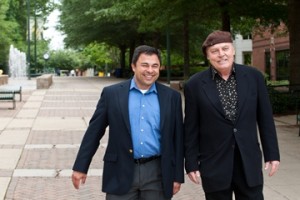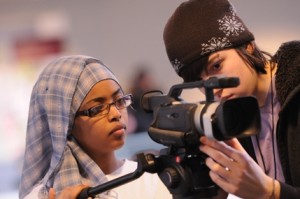Passion is infectious, even via the web. Mason’s MUSI 101 Introduction to Classical Music course proves this. The course was taught for the first time online in Fall 2012 and was recognized this month by a panel of faculty reviewers and instructional designers as a “Exemplary Distance Education Course.” The panel noted the course’s propensity to magnify existing musical interests and inspire new passions within students. This occurs thanks to the student-focused course design features and the instructor’s love of the topic.

Dennis M. Layendecker conducting
the George Mason University Symphony Orchestra.
Photo courtesy of Creative Services.
A learner-focused discussion about course content begins in the first course module and extends throughout the semester. In the first module, students are asked to write a blog introduction about themselves describing their past experiences with Classical music, their favorite kind of music, their favorite artists, and their favorite composers. After being introduced to a variety of instruments in a subsequent module, students explore any two instruments that spark their interest for a research assignment. Later, students get to choose a classical concert to attend and write a reflection about their experience. Every effort is made in the course design to allow students to make personal connections with music that they perhaps have not been exposed to previously.
The online MUSI 101 professor, Kelly Ker-Hackleman, sets the stage for students to share honest thoughts, judgments, and experiences by sharing her perspectives in an introduction video, mini-lectures, and assignment responses. “I don’t make my passion for music a secret, especially when recommending a concert or grading concert reflections,” Professor Ker-Hackleman commented. She is a pianist for the Alexandria Symphony and proclaims music as her life and love; so, sharing her excitement for music comes naturally.
Attendance at a classical music concert, and the related reflection, is highlighted as a climax feature of the MUSI 101 online course. “When students experience the anticipation of waiting in line to be seated, or the power of a crowd clapping in appreciation, and see the facial expressions and body movement of the performers, emotions are stirred up that may be missed if the concert was watched through multimedia,” explained Susan Campbell, the course instructional designer. Professor Ker-Hackleman said that “It is so rewarding to read a concert report written by a person who has just come from their first classical music concert, breathless from their new experience.” Music should move you and this course allows for that to happen.
Anyone who has an open mind and desire to expand their knowledge will succeed in and enjoy MUSI 101 online. Students who have enrolled in this course have had incredibly diverse musical backgrounds. Some former students had previously only listened to rap, a few had taken band and choir in high school and wanted to build upon the knowledge they gained there, and others were retired individuals who already adored classical music.
These previous MUSI 101 students recommended two keys to success for others considering the course. First, keep up with the weekly coursework. Students found it helpful to enter the prescribed study schedule into a personal calendar and follow it closely. Second, take advantage of the textbook materials. If a particular composer sparks your interest, explore using all of the supplementary materials in the online textbook. Allowing yourself to study what interests you will keep learning as exciting as it should be! Perhaps you will even discover a new passion along the way.
Mason offers several other Arts courses online. Please check the online course listing page then register for an online course via Patriot web.


